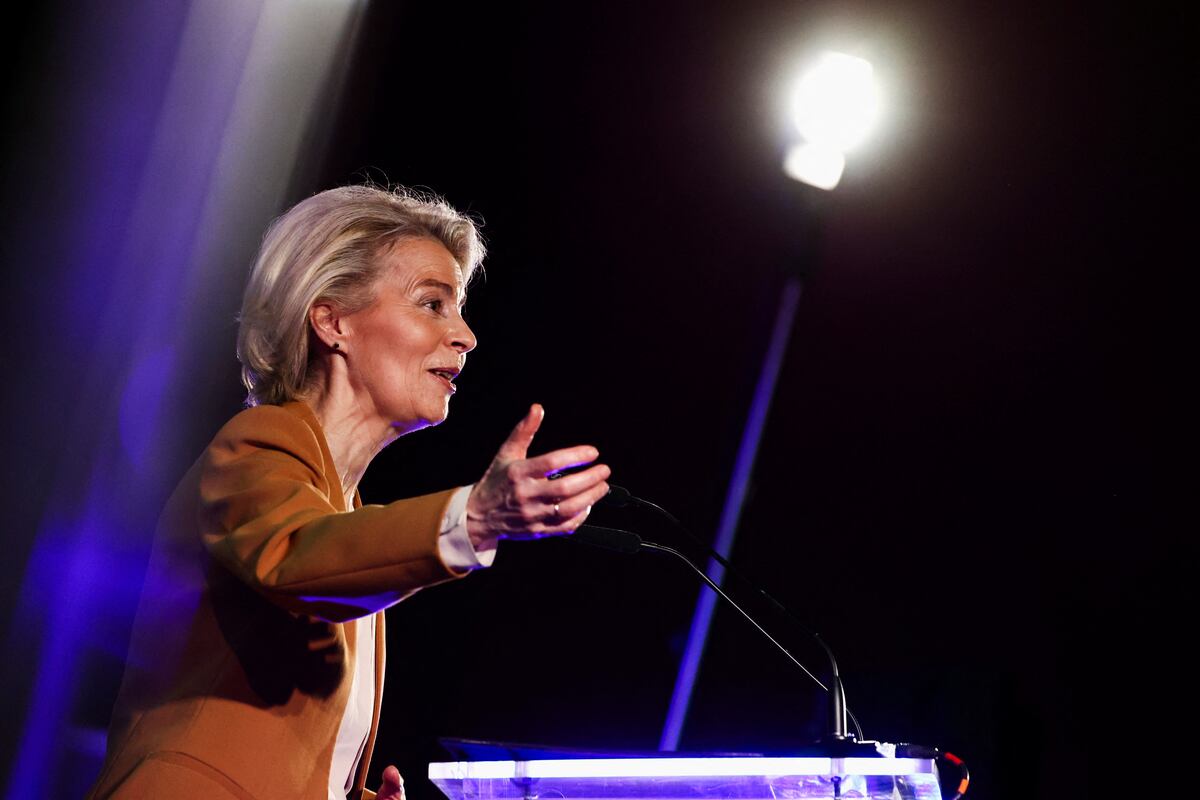Icon: enlarge
British Prime Minister Johnson, President of the European Commission von der Leyen (12 December photo)
Photo:
Xinhua / imago images
It was a barely disguised declaration of war on the British government: one would "use all possible instruments" to bring about justice in the vaccine trade, said Ursula von der Leyen last week.
The EU exported more than 41 million cans around the world, ten million of them to Great Britain alone.
They have come back from the island so far: nothing.
That, said the EU Commission President, will no longer be accepted.
It is important to create "reciprocity", if necessary with export bans.
The problem: To do this, the EU Commission might have to take measures in which many member states do not want to participate.
AstraZeneca plays an inglorious leading role in the dispute.
According to the Commission, the British-Swedish vaccine manufacturer has so far only delivered around 30 of the 120 million doses that it had contractually promised the EU for the first quarter.
In the second quarter there should be 70 instead of 180 million cans, at least according to current planning.
"But nobody believes that either," says a commissioner.
“When AstraZeneca gives numbers, no one takes out the pen.
They are only noted in pencil. "
The reason for the reduced delivery volume: The contract between AstraZeneca and the British government allegedly provides that the UK has the first right to the vaccines.
The EU counters that AstraZeneca has also committed to deliver - from four plants, two of which are in Great Britain.
The British government does not only want to export nothing to the EU - it also wants to import millions more vaccine doses from there.
The UK government is alarmed
The focus is now on the factory of AstraZeneca contractor Halix in Leiden, the Netherlands.
It has not yet been officially approved by the EU Medicines Agency (EMA).
Nevertheless, so it is said from EU circles, the AstraZeneca vaccine has been produced there for a long time, meanwhile millions of doses are piled up in the warehouse.
A spokeswoman for the British government also admits that it is about "substantial amounts".
They should now be targeted by the Commission - together with the vaccine that is to be produced in Leiden in the future.
A decision on an export ban is now to be made at the EU summit on Thursday and Friday, and a video conference is planned.
Apparently, people in London are alarmed.
British Prime Minister Boris Johnson already spoke on the phone with Chancellor Angela Merkel and French President Emmanuel Macron at the weekend, as confirmed by the government spokeswoman.
He had previously spoken to Dutch Prime Minister Mark Rutte and Belgian Prime Minister Alexander De Croo.
"It has to be fair"
That shouldn't be a coincidence, because the Netherlands and Belgium are considered to be relatively conciliatory towards Great Britain.
Both recently advised against an escalation in the vaccine dispute with the British.
They are particularly concerned about precursors that are important for the manufacture of vaccines in the EU, some of which come from the UK.
In Berlin, too, there are warnings of export bans.
France and Italy are taking a harder line.
Italy was the first country to take action and recently stopped exporting 250,000 AstraZeneca cans to Australia.
The French government also appears to be ready to take such steps.
"If you are dependent on one another, it has to be fair," says a French diplomat.
For this view of things there is an "overwhelming majority" among the member states.
Commission chief von der Leyen, however, no longer wants to have to justify export bans on the basis of the contractual loyalty of individual manufacturers, but instead wants to introduce a new criterion: fairness.
Countries that do not let any vaccine out of the country themselves should not get any more from the EU in the future.
Because in order to achieve even an approximate balance in the vaccine exchange between the EU and Great Britain, the exports of other manufacturers might also have to be slowed down, above all Biontech / Pfizer.
However, there is considerable resistance among the member states.
Their ambassadors met last week shortly after the von der Leyens press conference - and were not only surprised at the severity of the threats made by the Commission President, as several participants confirmed to SPIEGEL.
A large majority, including Germany, were strictly against stopping exports of the Biontech / Pfizer vaccine.
"You cannot punish companies that fulfill their obligations," said an EU diplomat.
The chances of an export stop increase with the number of infections
Von der Leyen could get into trouble if she takes action against AstraZeneca again.
Should the Dutch government approve the export of the vaccines from the Halix warehouse, the Commission could overrule them.
But whether it would do so is at least questionable.
This is one of the reasons why von der Leyen wants the heads of state and government to discuss the export bans at the summit.
If a majority is in favor, the Dutchman Rutte would also have to go along with it.
The chances of success are currently increasing with the number of infections.
The EU heads of state and government are under enormous pressure, some of them have to announce tightening of the anti-corona measures again these days.
Summer vacations abroad are becoming less likely for continental Europeans.
The British are completely different: their government wants to offer everyone a vaccination by the end of July.
Celebrating Britons on the beach, frustrated EU residents at home - images like this are a horror in EU capitals.
If the pandemic situation looks even darker in three weeks, says an EU diplomat, a lot would be possible, perhaps including export bans for the Biontech / Pfizer vaccine.
This would probably set the British vaccination campaign back by weeks, and the British might also have to forego beach vacations.
The political damage to Johnson would be immense.
After all: the EU would then have created reciprocity.
Icon: The mirror









/cloudfront-eu-central-1.images.arcpublishing.com/prisa/KMEYMJKESBAZBE4MRBAM4TGHIQ.jpg)



